San Francisco’s retail landscape is facing a significant challenge, with rampant shoplifting forcing major stores to reconsider their presence in the city. Following Walgreens’ announcement of multiple store closures due to escalating theft, questions are now being raised about the future of other retail giants in San Francisco, particularly Target. Despite Mayor London Breed’s attempts to downplay the impact of crime on store closures, a starkly different reality is emerging from the ground level, particularly at the Target store located on Mission Street.
Recent reports, directly from San Francisco Police Department (SFPD) officers, paint a grim picture of the situation at the Target Mission Street location, situated between Third and Fourth Streets. These officers, speaking exclusively to the California Globe, revealed alarming details about the daily losses incurred by the store due to shoplifting.
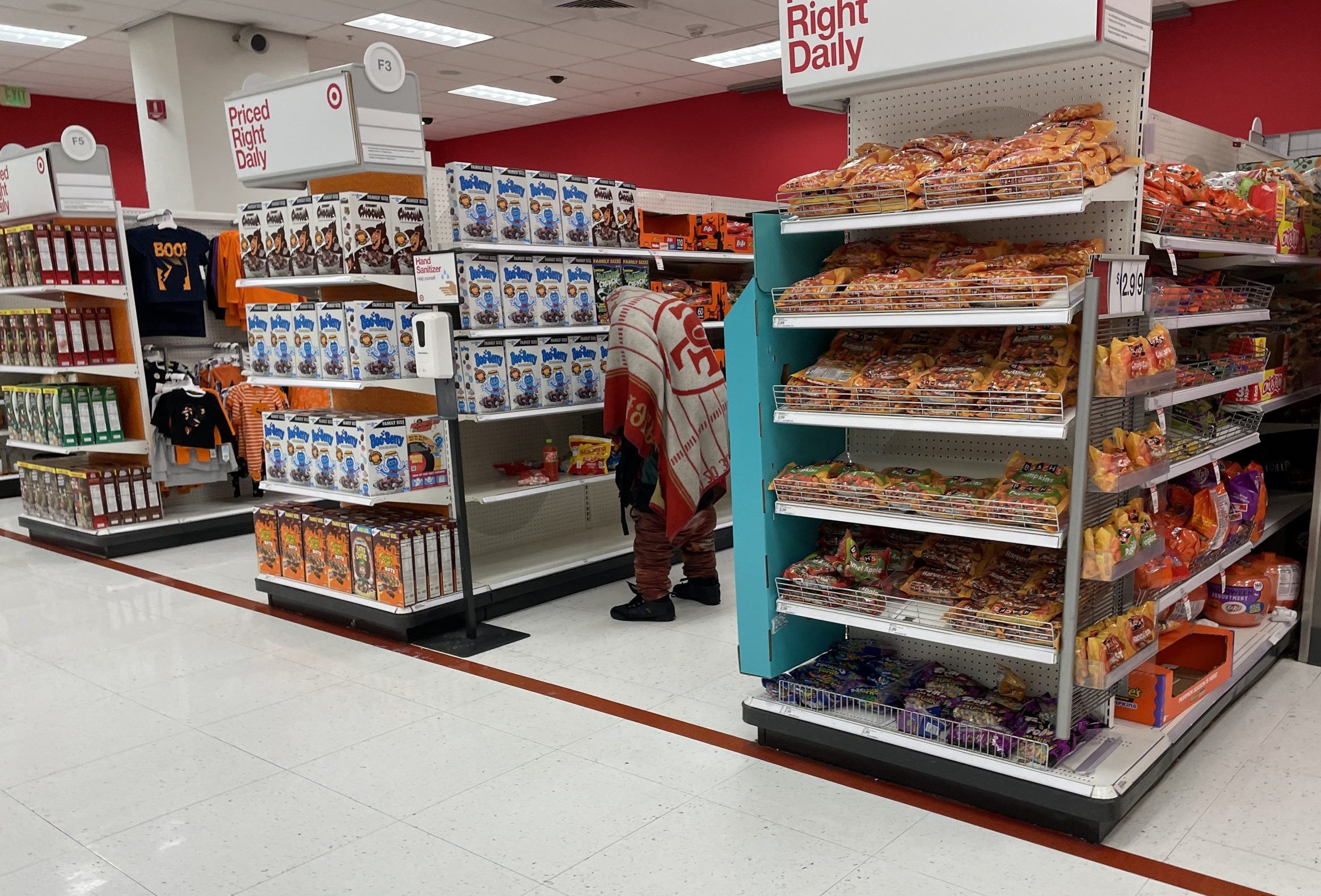 Man brazenly shoplifts at Target Mission Street, San Francisco, stuffing goods into pants.
Man brazenly shoplifts at Target Mission Street, San Francisco, stuffing goods into pants.
Daily Shoplifting Losses at Target Mission Street Reach $25,000
According to SFPD officers stationed at the Target Mission Street store, the location is losing an estimated $25,000 daily to shoplifting. In taped interviews, one officer stated, “This store loses $25,000 a day to shoplifting. That’s $25,000 that walks out the door on average between 9 and 6 every day.” This staggering figure highlights the immense scale of the problem facing retailers in the area.
Despite the store’s substantial daily sales, ranging from $80,000 to $120,000, the massive losses from theft are severely impacting profitability. “Even if they’re making 25% profit, the stealing takes that down to zero,” the officer explained, underscoring the unsustainable nature of these losses.
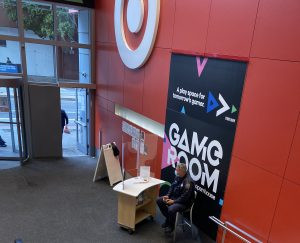 Armed San Francisco Police Department officers patrol Target Mission Street due to rampant shoplifting.
Armed San Francisco Police Department officers patrol Target Mission Street due to rampant shoplifting.
Lack of Consequences Fuels Repeat Offenses at Target Mission Street
The presence of uniformed and armed SFPD officers at the Target Mission Street store is a visible attempt to deter theft. However, officers on the ground report that this presence has minimal impact due to the lack of legal repercussions for shoplifters.
“They don’t care. There’s no consequences. Literally zero consequences,” one officer emphasized. He detailed his daily routine of confronting and removing shoplifters, often recovering stolen merchandise. “I probably have already kicked out eight or nine people and I’ve recovered a thousand dollars worth of stuff alone off of that.”
Despite these efforts, the officer lamented the futility of the situation: “Whether we kick them out, tell them they can’t come back, whether I put them in handcuffs and take them down to the county jail—there is no difference. Because they will not be prosecuted by the district attorney. Therefore, there is nothing documented that they can’t come back here.”
This lack of prosecution creates a revolving door, with the same individuals repeatedly targeting the store. “In this store the same exact people come in every other day and in the city the same couple percent of people are the same people committing all the car break-ins, all the robberies and all the shootings,” the officer explained, highlighting the broader implications of the lenient approach to retail crime. “There is zero consequence. Therefore you take them to jail they get out of jail. They do it again. It’s a big circle.”
Target Mission Street Implements Drastic Anti-Theft Measures
In response to the escalating shoplifting crisis, Target has implemented increasingly stringent anti-theft measures at its Mission Street store. These measures extend far beyond typical high-theft items, reflecting the severity of the problem.
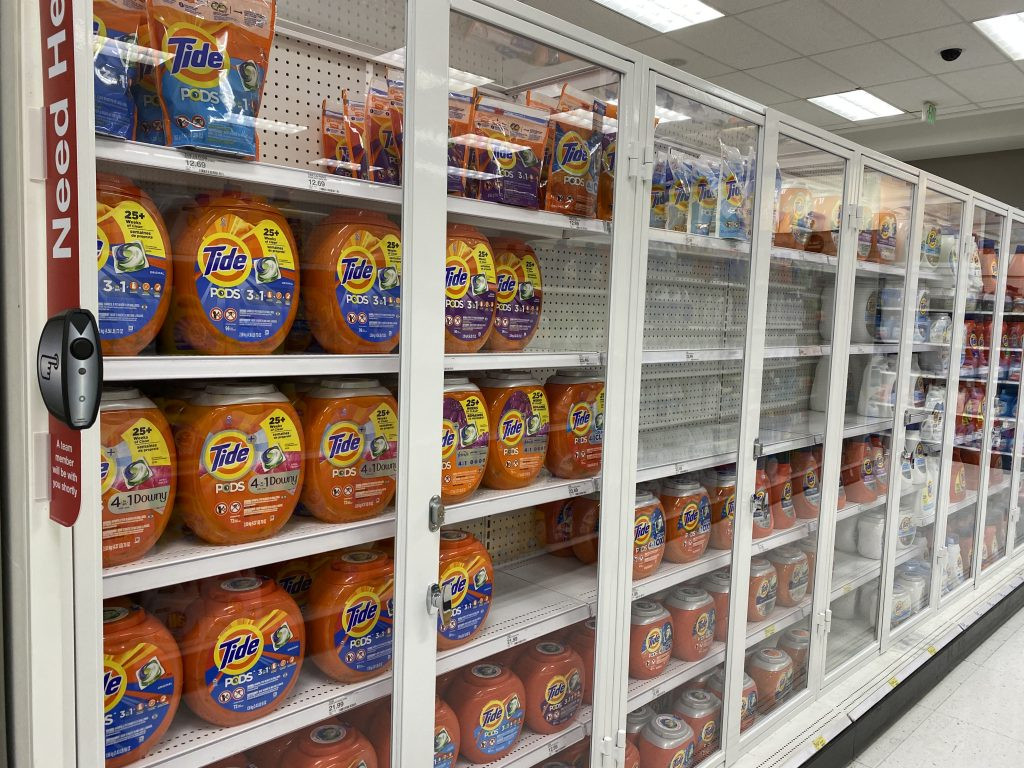 Even everyday items like Tide detergent are locked up at Target Mission Street due to high theft rates.
Even everyday items like Tide detergent are locked up at Target Mission Street due to high theft rates.
Once limited to items like Tylenol and razors, locked displays now protect a wide range of goods, including everyday necessities. Laundry detergent, even bulky and heavy brands like Tide, are kept behind lock and key at Target Mission Street. Vitamins, false eyelashes, Nicorette, skin creams, Lego sets, water bottles, hairdryers, and even body wash are all secured with anti-theft devices. “Even the ‘fancy’ toothpaste” is under lock and key, according to the original report.
 Target employee installs more security measures as Target Mission Street faces potential closure amid shoplifting surge.
Target employee installs more security measures as Target Mission Street faces potential closure amid shoplifting surge.
These measures, while intended to curb theft, create significant inconvenience for honest shoppers. The need to request assistance for everyday items slows down the shopping process and can be perceived as demeaning. As the original article notes, it leads to “an embarrassing quest to find a customer service person who now needs to be told of a shopper’s smelliness, dry skin and frizzy hair” when requesting body wash or skin cream.
In July, Target also reduced the store’s operating hours, further impacting customer convenience. The Target Mission Street location, previously open from 8 am to 10 pm, now operates only from 9 am to 6 pm. This reduction, while aimed at minimizing theft during late hours, inconveniences working San Franciscans who struggle to shop after work.
Impact on Community and Employee Morale at Target Mission Street
The relentless shoplifting and the measures taken to combat it are taking a toll on both the community and the employees of the Target Mission Street store. Limited hours and restricted access to products make shopping less convenient for law-abiding customers.
 Shoplifters brazenly consume items in Target Mission Street and leave empty containers on shelves.
Shoplifters brazenly consume items in Target Mission Street and leave empty containers on shelves.
Beyond outright theft, the store also experiences significant losses from “consumption theft,” where individuals consume products inside the store without paying. Empty containers and packaging are often left on shelves, a demoralizing sight for both employees and shoppers. Candy displays are routinely ransacked, becoming “grab a free handful” situations.
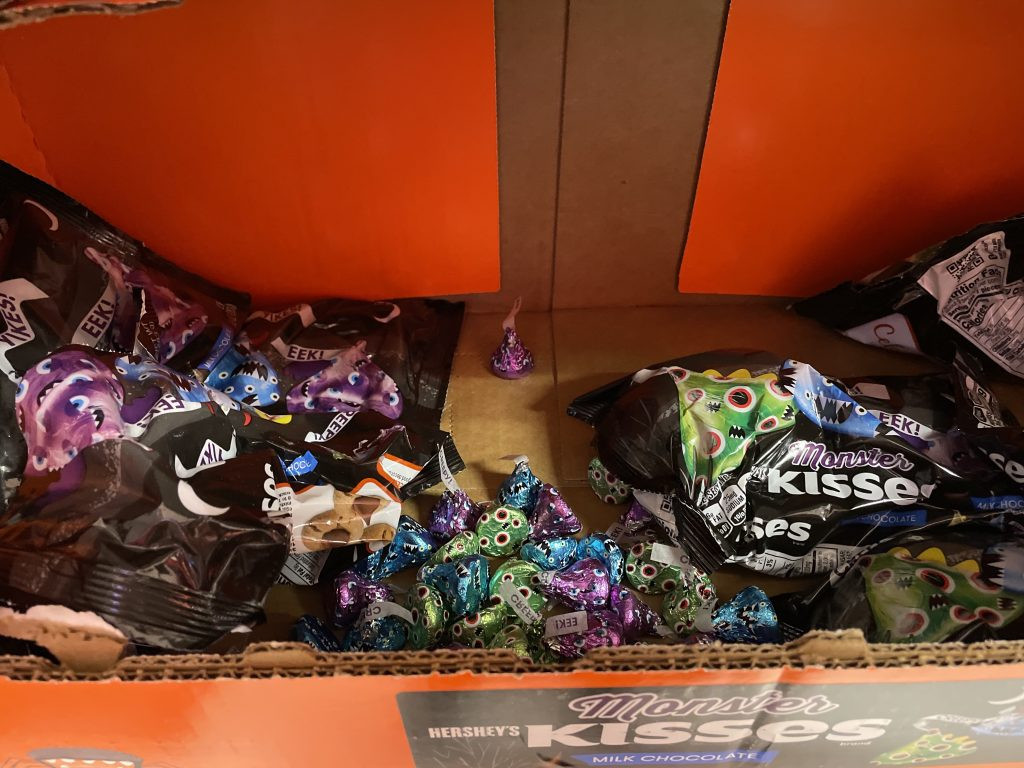 Open candy displays become 'free-for-all' due to shoplifting at Target Mission Street.
Open candy displays become 'free-for-all' due to shoplifting at Target Mission Street.
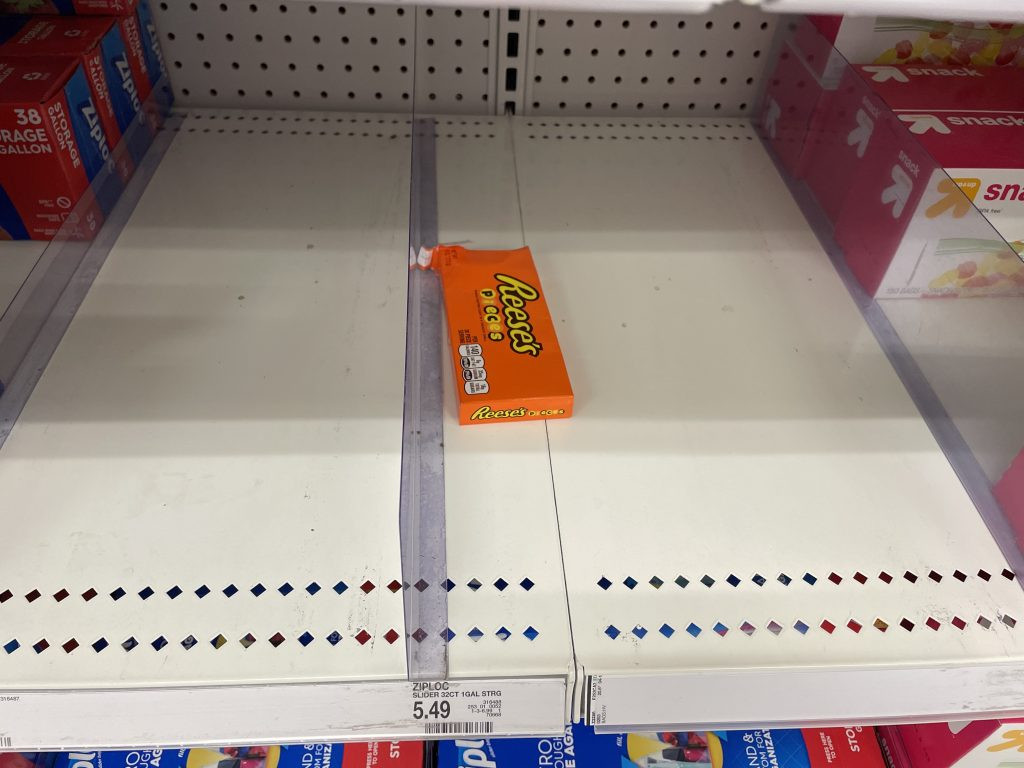 Opened and damaged goods are common due to shoplifting at Target Mission Street.
Opened and damaged goods are common due to shoplifting at Target Mission Street.
Employee morale is also suffering. The original article quotes “Irene, a checker,” who expresses her frustration at witnessing rampant theft while struggling to make an honest living. The impending closure of the store, initially reported by SFPD officers, further exacerbates these feelings.
Political Pressure and Target’s Response Regarding Mission Street
Despite the dire situation at the Target Mission Street store, local political pressure has reportedly been exerted to keep the location open. SFPD officers indicated that “our mayor, London Breed, everybody would lose their mind, they’ve been very adamant, ‘Do not close this place.'”
However, Target’s corporate perspective is driven by financial realities. “Target they don’t care. They are like, they see the numbers, right,” one officer stated, suggesting that the financial losses may ultimately outweigh political considerations.
Following the initial reports of the Target Mission Street closure, a Target spokesperson issued a denial to the California Globe. Joe Poulos, Target’s Senior Director of Communications, stated, “The information posted to California Globe about our stores is not accurate. We are not closing the Mission St. store.” Mr. Poulos did confirm the closure of the San Francisco Central Business District East store on Bush Street, citing “years of underperforming sales.”
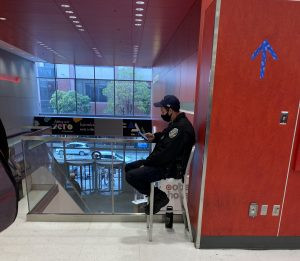 San Francisco police emphasize the need for prosecution changes to combat shoplifting impacting stores like Target Mission Street.
San Francisco police emphasize the need for prosecution changes to combat shoplifting impacting stores like Target Mission Street.
Call for Policy Change to Address San Francisco’s Retail Crime
The situation at Target Mission Street and other San Francisco retailers points to a systemic issue requiring significant policy changes. As one SFPD officer succinctly put it, “The prosecution has to change.” Another officer expressed a more pessimistic outlook: “It will never change.”
The officers argue that until there are meaningful consequences for shoplifting, the cycle of theft and retail disruption will continue. The heavy security measures, reduced hours, and potential store closures are all symptoms of a larger problem rooted in the lack of effective prosecution of retail crime in San Francisco.
While Target denies the immediate closure of the Mission Street location, the underlying issues of rampant shoplifting, substantial financial losses, and demoralized employees remain. The future of retail in San Francisco, and the Target Mission Street store specifically, hinges on addressing the root causes of this crisis and implementing effective solutions.
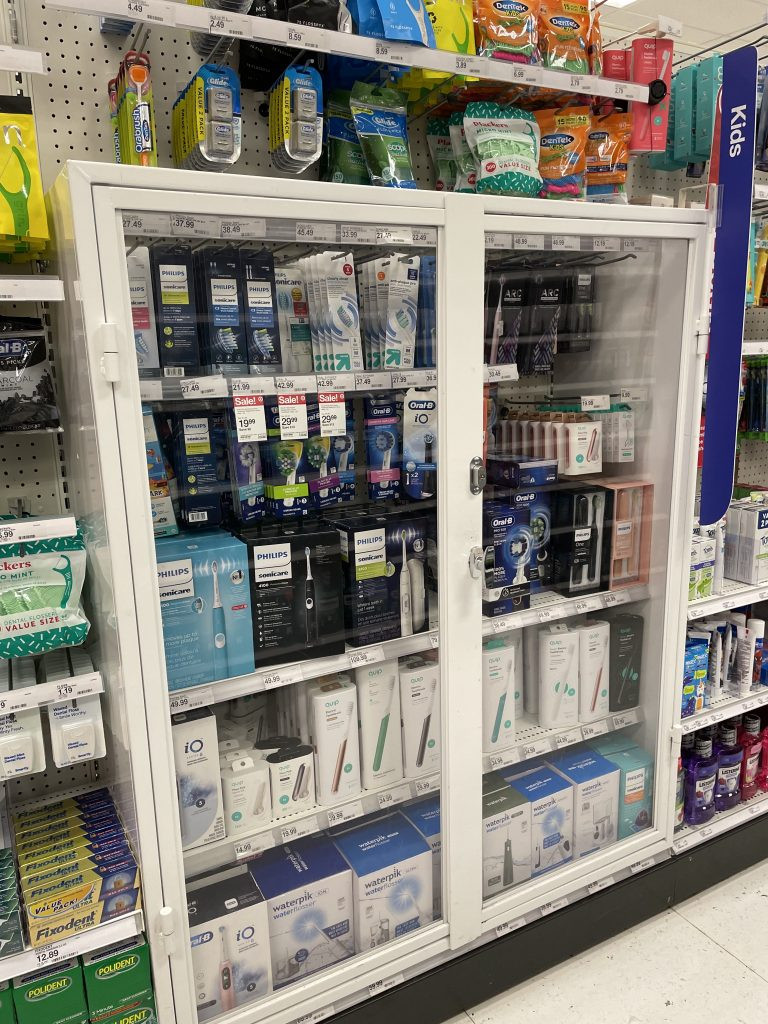 Small, high-value items like electric toothbrushes are under lock and key at Target Mission Street.
Small, high-value items like electric toothbrushes are under lock and key at Target Mission Street.
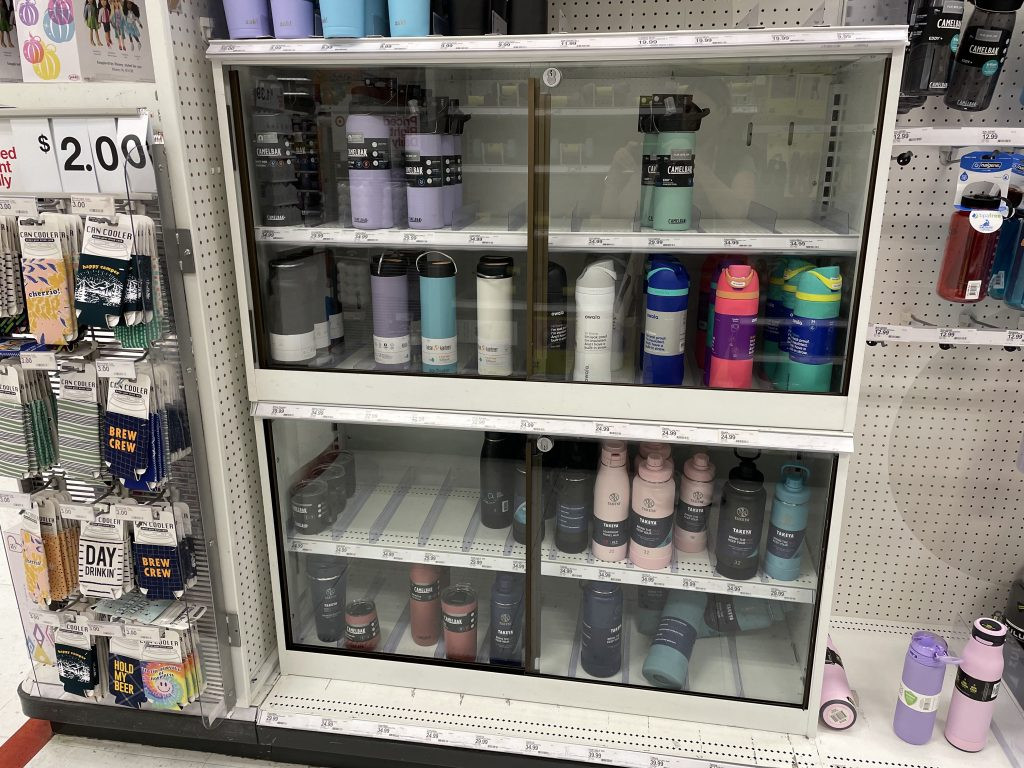 Even basic items like water bottles require staff assistance to access at Target Mission Street.
Even basic items like water bottles require staff assistance to access at Target Mission Street.
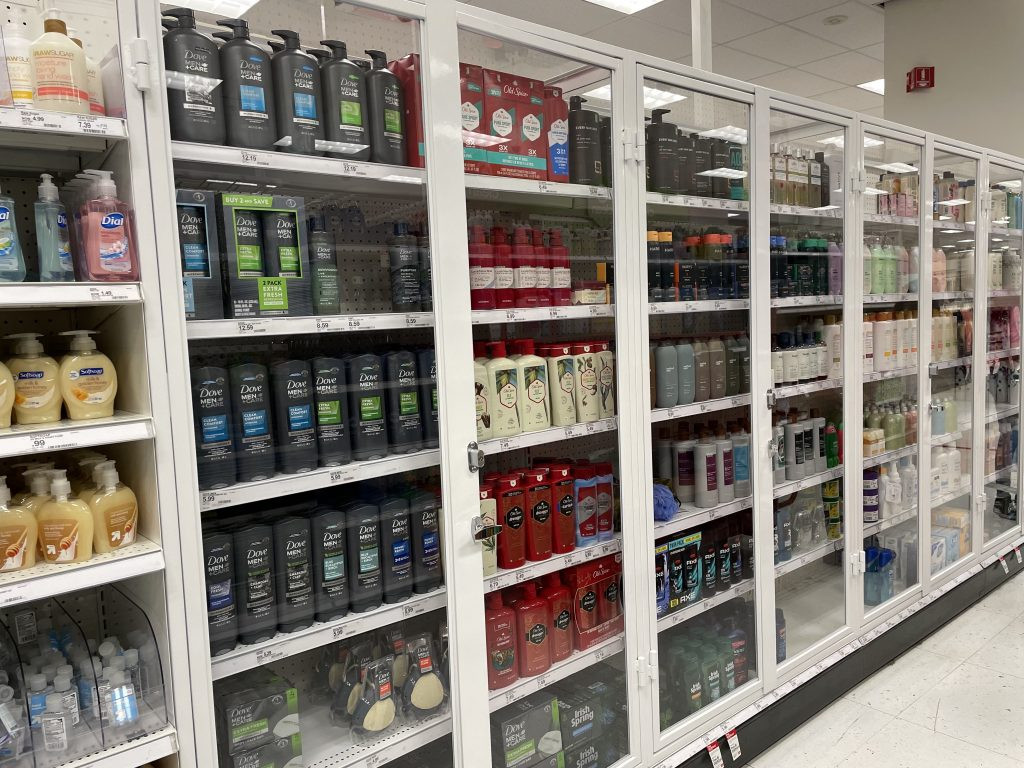 Body wash, a frequently stolen item, exemplifies the organized retail theft affecting Target Mission Street.
Body wash, a frequently stolen item, exemplifies the organized retail theft affecting Target Mission Street.
